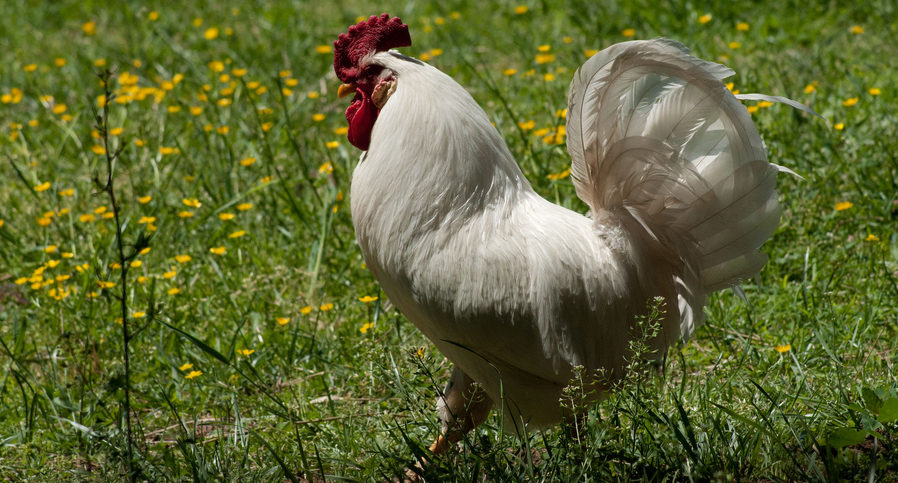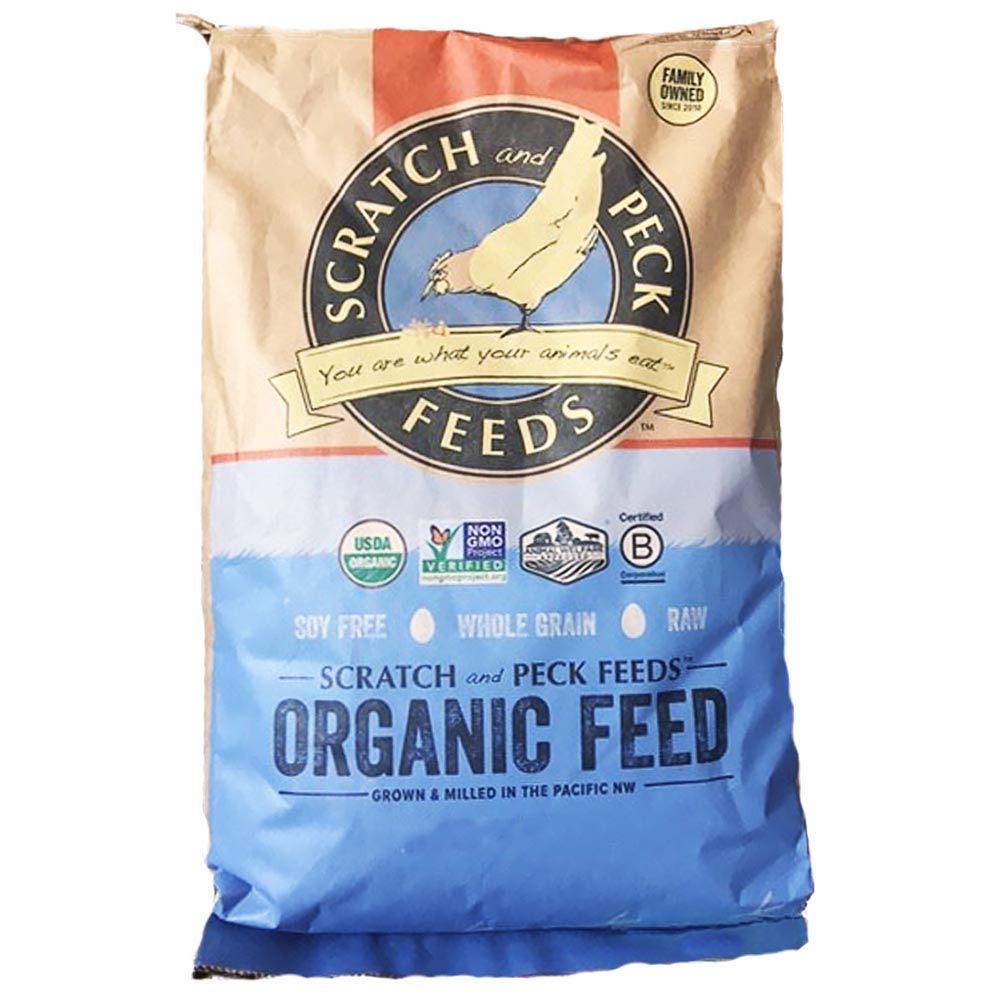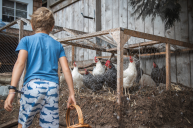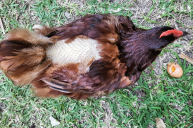A look at the benefits and the downsides of free-range chickens.
Future backyard chicken owners often dream of picturesque free ranging, happy chickens dotting their lawn, eating insects, and roaming freely in the fresh air. However, before you let them out of the chicken yard and open up the chicken run to free range your backyard chicken flock, it makes sense to take a look at benefits and downsides of letting chickens roam.
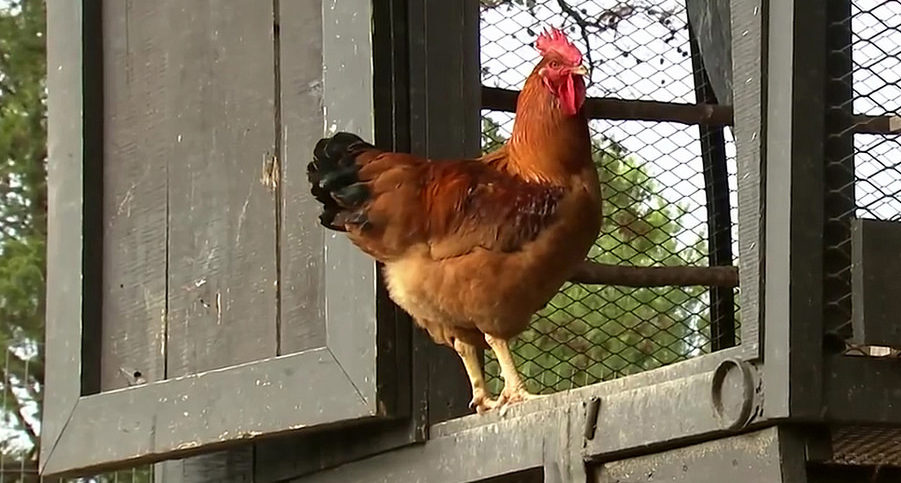
Photo: Flickr user Sas.sy
Drawbacks of Free-Range Chickens
Do you like going barefoot?
Watch for chicken poop everywhere and anywhere. We have to keep our chickens in their run a couple days before birthday parties and family gatherings so that the lawn and drive are clean.

Photo: Flickr user fishermansdaughter
Free-range chickens will also scratch and dig dust bathing spots, usually in a sunny spot of your lawn.
You'll identify these easily: a circular dirt hollow right in the middle of a lawn or flower bed.
Is your vegetable garden protected? Free-range chickens ate all our bean seedlings this past spring and pecked our ripe red tomatoes last year. You can protect your garden with a fence or netting.
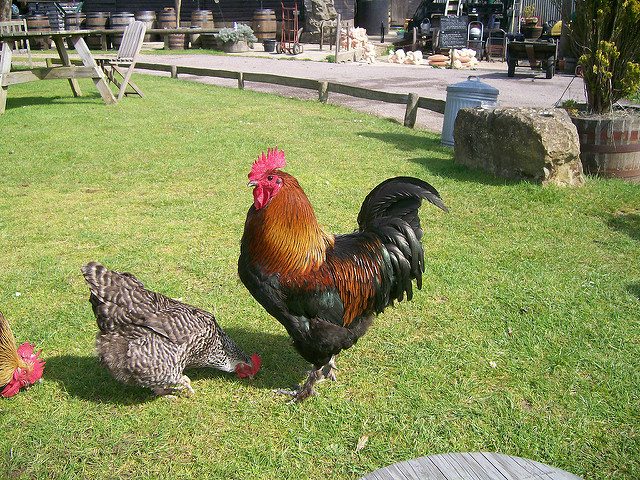
Photo: Flickr user Lutrus
Are your neighbors good with wandering chickens, or do you have a fence?
Free-range chickens don't stay within property lines without fences. Your neighbors may not love chicken poop or pecks.

Photo: Flickr user Naomi
Is your family good with chickens on the deck or the porch?
My husband shoos chickens off the deck. We have one that likes to sit and reflect under the grill. I thought she was laying eggs, but she just sits.
READ MORE: Five Life Lessons Learned from Keeping Backyard Chickens
Increased danger to your chickens from predators. (Four-legged and aerial)
Hawks, eagles, wandering dogs, and foxes are potential predators who will find it much easier to target your chickens without a protective run. Providing cover by overhead trees, shrubs, and places they can hide in, run into, or run under (like a porch or a coop) can assist with predator protection, as can supervised free ranging, where you are outside with the flock. Some owners also have protective dogs as a sort of livestock or flock "guard dog."
Hidden eggs and surprise chicks.
Your laying hens may be tempted to search out a secret nest instead of your chicken coop nesting boxes, so it can be a pain to collect some free-range eggs. You may find a missing hen is actually a broody mama when she returns with chicks after a three-week absence.
https://www.instagram.com/p/BXBvTerlhFU/?taken-by=beanandbantam
Benefits of Free-Range Chickens
One of the reasons we let our chickens free-range is for tick control.
We live in a rural area, and we have ticks in our backyard. Their numbers are lower with free roaming chickens. Chickens also eat grubs, Japanese beetles, squash bugs, and other pests.
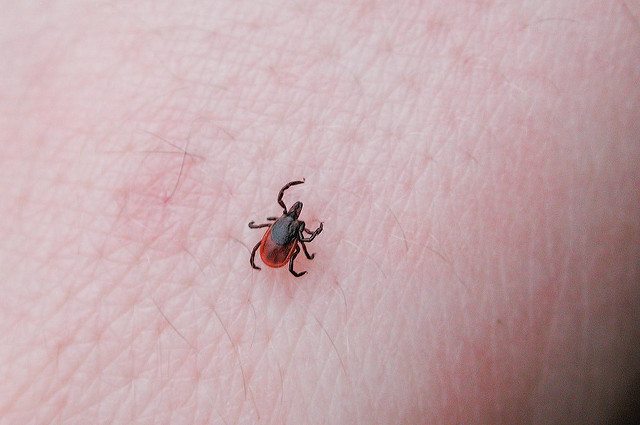
Photo: Flickr user Spex
Free-range poultry will lower your lawn fertilizer costs.
Chickens provide natural fertilization wherever they wander. We haven't fertilized our lawn in years.

Photo: Flickr user Lindsay Holmwood
Healthier eggs.
Free-range chickens have access to a varied diet of plants and insects (good protein sources) to supplement their feed. Studies have also shown that eggs from free-range hens have lower levels of "bad" cholesterol.
Giving your chickens free range is healthy for the chickens and for you!
Fresh Eggs Daily.
Keeping chickens is a lot of fun and one of the biggest benefits is in spring you'll have fresh eggs daily. I mean every day. Whether you have a small or large backyard flock your egg-laying hens are on fire after winter ends. Chickens need at least 14-15 hours of light a day.
Also even if you do free-range your birds they'll need a good layer feed.
This is our fave chicken feed.
Scratch and Peck Feeds - Naturally Free Organic Layer Feed for Chickens and Ducks
Scratch and Peck's Organic Layer Feed is by far one of the best brands to consider for your ladies. I've been feeding this for over a year and the eggs are beautiful and the hens healthy. Available for $37.99.
Reduced stress from an increase in space may lead to higher egg production, reduced feather picking, and happier chickens.
Nothing wrong with that!
In conclusion, there are drawbacks and benefits to letting your chickens roam. As with anything, you have to balance the good with the bad. Perhaps you need a chicken tractor or other free-range systems instead of a fully free-range flock, or perhaps allowing only supervised free range when you are home. Maybe a guard dog for your chickens? What is right for your flock?
Do you free range your chickens? Let us know in the comments below!
WATCH NOW: How to Have the Best Tasting Eggs from Your Backyard Chickens
